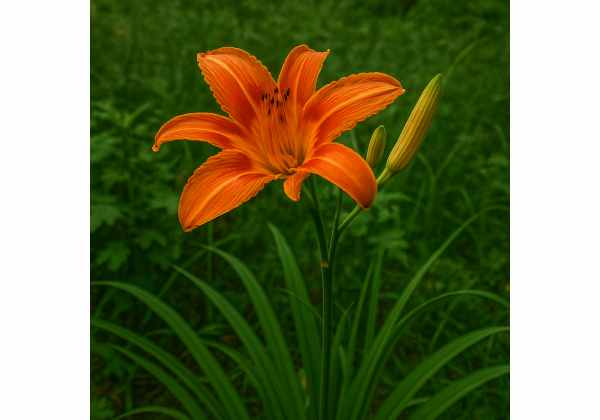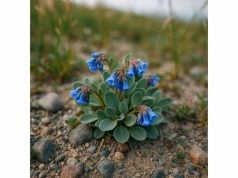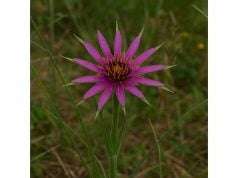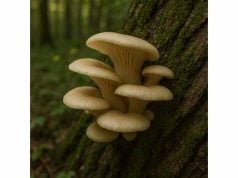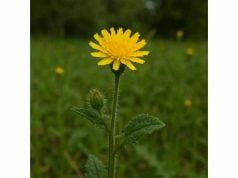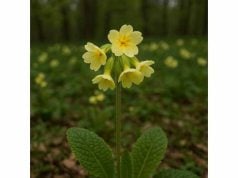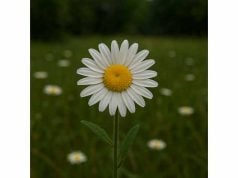Orange Daylily is a vibrant perennial flower celebrated not only for its striking orange blossoms but also for its impressive array of health benefits and medicinal properties. Rich in antioxidants, anti-inflammatory compounds, and essential phytochemicals, this herb supports immune function, cardiovascular health, and overall vitality. Traditionally used in herbal remedies and culinary preparations, it offers a holistic approach to well-being. In this article, we delve deep into the botanical profile, chemical makeup, health advantages, diverse applications, and significant scientific research surrounding Orange Daylily. Join us as we explore this fascinating herb in detail and uncover practical tips for safe and effective use.
Table of Contents
- Floral Origins and Identification
- Chemical Makeup and Vital Compounds
- Health Advantages and Core Qualities
- Practical Applications and Safety Guidelines
- Research Discoveries and Key Study Insights
- FAQ
Floral Origins and Identification
Orange Daylily, a member of the Hemerocallis genus, has enchanted gardeners and herbal enthusiasts alike with its radiant blossoms and remarkable resilience. Belonging to the family Asphodelaceae, this herb is distinguished by its elegant structure and vibrant hue. Originating from diverse regions where temperate climates meet ample sunlight, it thrives in well-drained soils and exhibits a robust adaptability to varying conditions.
Botanical Classification and Morphology
The taxonomic structure of Orange Daylily places it among the ornamental and medicinal plants prized for their beauty and utility. Its botanical identity is marked by long, slender, and arching leaves that arise from a basal rosette, providing a lush, green backdrop to the standout orange flowers. Each bloom lasts for a single day, a characteristic that gives daylilies their common name. However, the fleeting nature of individual blooms is compensated by a continuous flowering cycle throughout the growing season. The petals, with their delicate veining and soft texture, often exude a subtle fragrance that further enhances their appeal.
Growth Conditions and Natural Habitat
Native to regions that offer a blend of sunny days and moderate water availability, Orange Daylily flourishes under conditions that mimic its natural habitat. Preferring full sun exposure, it benefits from ample natural light to produce its vivid orange color. Well-drained soil enriched with organic matter is ideal for its growth. In natural settings, these plants often form clusters that provide ground cover, making them popular in landscape designs. Gardeners and herbalists appreciate its low-maintenance nature; once established, it demonstrates remarkable drought tolerance while still producing abundant and aesthetically pleasing blooms.
Distinctive Characteristics and Identification Tips
Identifying Orange Daylily in the wild or in a cultivated garden is facilitated by its unmistakable orange blossoms. Unlike many of its relatives, the Orange Daylily boasts a more intense pigmentation, a result of high concentrations of carotenoids and other natural pigments. The flowers typically exhibit a subtle gradient from a deep, rich orange at the center to a paler hue at the edges, adding to their visual intrigue. Furthermore, the plant’s slender, strap-like leaves and its upright growth habit distinguish it from other ornamental flowers. Its overall symmetry and uniform appearance make it a favorite for both ornamental use and natural herbal remedies.
Historical and Cultural Significance
Historically, daylilies have been incorporated into various traditional medicinal practices across Asia and other regions. Orange Daylily, in particular, has been recognized for its therapeutic applications, ranging from boosting the immune system to alleviating inflammation. Its use in herbal teas, tinctures, and extracts is well-documented, and it continues to be a subject of interest for modern phytotherapy. In many cultures, the flower symbolizes renewal and rejuvenation—a reflection of its daily cycle of bloom and fade. This dual nature of beauty and utility reinforces its status as a cherished plant in both ornamental and medicinal contexts.
Cultivation and Care Recommendations
For those wishing to cultivate Orange Daylily, selecting a sunny spot with well-drained soil is crucial. Regular watering during the establishment phase, followed by periodic deep watering sessions, helps promote robust growth. Organic compost added to the soil can enhance nutrient content, fostering healthier blooms and stronger foliage. Pruning spent flowers encourages new growth and prolongs the flowering season. Additionally, mild fertilization during the growing season can boost overall plant health. Gardeners are advised to monitor for common pests and diseases—although the resilient nature of daylilies typically ensures that such issues are minimal when proper care is maintained.
Environmental Impact and Sustainability
Beyond its aesthetic and medicinal value, Orange Daylily plays a role in supporting local ecosystems. Its flowers attract pollinators such as bees, butterflies, and hummingbirds, contributing to biodiversity and the health of the surrounding flora. Sustainable cultivation practices not only preserve this natural resource but also encourage organic gardening and eco-friendly landscaping. As interest in natural remedies and sustainable living continues to grow, the cultivation of Orange Daylily offers an excellent example of how beauty and functionality can coexist in a manner that benefits both humans and the environment.
In summary, the botanical profile and identification of Orange Daylily reveal a plant that is as adaptable as it is beautiful. Its unique morphology, coupled with its rich cultural history and environmental benefits, makes it a prized addition to both gardens and herbal medicine cabinets. Whether encountered in the wild or nurtured in a home garden, Orange Daylily stands out as a symbol of natural elegance and enduring vitality.
Chemical Makeup and Vital Compounds
Orange Daylily is not only celebrated for its ornamental beauty but also for its potent bioactive constituents that underpin its medicinal value. The herb’s complex phytochemical profile includes a variety of compounds that work synergistically to deliver multiple health benefits. Here is an exploration of the key chemical constituents that contribute to its healing properties:
- Flavonoids (Luteolin and Quercetin)
Flavonoids are essential antioxidants found abundantly in Orange Daylily. Luteolin and quercetin help combat oxidative stress, neutralize free radicals, and reduce inflammation. These compounds contribute significantly to the herb’s ability to support cardiovascular health and promote a balanced immune response. Their presence is also linked to improved skin health and potential anticancer properties. - Carotenoids (Beta-Carotene and Lutein)
Carotenoids are responsible for the vivid orange coloration of the blooms. Beta-carotene, a precursor to vitamin A, plays a crucial role in vision and skin health, while lutein is known for its benefits in eye health and cognitive function. These compounds work as natural antioxidants, protecting cells from damage and supporting overall vitality. - Polysaccharides
The complex carbohydrate structures in Orange Daylily have immune-modulatory effects, aiding in the enhancement of the body’s natural defense mechanisms. Polysaccharides support gut health and are known to help regulate blood sugar levels, contributing to improved metabolic health and reduced inflammation. - Phenolic Compounds
Rich in phenolic acids and other related compounds, Orange Daylily exhibits strong anti-inflammatory properties. These molecules are effective in mitigating cellular stress and protecting against chronic diseases, including heart disease and certain types of cancer. Their antioxidant activity also supports overall cellular health and longevity. - Saponins
Saponins in the herb contribute to its cleansing and immune-supporting properties. These naturally occurring compounds are known for their ability to lower cholesterol and boost the immune system, making them valuable in maintaining cardiovascular health and providing a natural detoxifying effect. - Alkaloids (Mild and Beneficial)
While not as abundant as other compounds, certain alkaloids present in Orange Daylily exhibit mild stimulant and analgesic properties. These alkaloids can contribute to enhanced mental clarity and a subtle mood lift when the herb is consumed in moderate amounts, complementing its other health benefits.
Each of these bioactive compounds plays a specific role in the overall therapeutic profile of Orange Daylily. Their combined effects provide a multi-faceted approach to health, from reducing inflammation and oxidative stress to supporting cardiovascular and immune functions. Researchers continue to explore these constituents to better understand their individual contributions and synergistic potential, paving the way for new applications in modern herbal medicine. The robust chemical makeup of Orange Daylily not only underpins its traditional uses but also supports its emerging role in contemporary wellness practices.
Health Advantages and Core Qualities
Orange Daylily is renowned for its impressive range of health benefits that cater to a variety of wellness needs. Through centuries of traditional use and modern scientific inquiry, this herb has earned a reputation as a natural ally in promoting overall health. Its unique profile of antioxidants, anti-inflammatory agents, and bioactive compounds contributes to an array of benefits that support both physical and mental well-being.
Antioxidant Power and Cellular Protection
At the heart of Orange Daylily’s therapeutic potential is its high antioxidant capacity. The flavonoids and carotenoids present in the herb work in tandem to neutralize harmful free radicals. This activity is essential in protecting cells from oxidative damage, which is a key factor in aging and the development of chronic diseases. Regular consumption of preparations made from Orange Daylily may help bolster the body’s natural defense mechanisms against environmental stressors and toxins.
Anti-Inflammatory Benefits
Inflammation is a common underlying factor in many chronic conditions, including arthritis, cardiovascular disease, and metabolic disorders. The phenolic compounds and saponins in Orange Daylily have been shown to possess strong anti-inflammatory properties. By reducing inflammation at the cellular level, the herb can help alleviate discomfort, improve joint mobility, and support overall systemic health. This anti-inflammatory action also plays a role in maintaining healthy blood vessels and reducing the risk of heart-related issues.
Immune System Support
The polysaccharides and mild alkaloids found in Orange Daylily contribute to a robust immune response. These compounds help stimulate the production of key immune cells, thereby enhancing the body’s ability to fend off infections and maintain a balanced immune function. For individuals seeking natural ways to boost their immune system—especially during seasonal changes—integrating Orange Daylily into their routine can be a valuable strategy.
Cardiovascular and Metabolic Health
Several studies have highlighted the cardiovascular benefits of compounds present in Orange Daylily. The combination of antioxidants, anti-inflammatory agents, and cholesterol-lowering saponins supports heart health by reducing oxidative stress, managing blood pressure, and improving lipid profiles. Additionally, the herb’s ability to regulate blood sugar levels and enhance metabolic function makes it a promising natural remedy for individuals with metabolic syndrome or type 2 diabetes.
Cognitive and Mood Enhancement
Beyond its physical health benefits, Orange Daylily may also contribute to improved cognitive function and mental clarity. Some of the bioactive compounds in the herb are believed to have neuroprotective effects, potentially supporting memory and learning. Moreover, the gentle stimulatory effects of the alkaloids can help enhance mood and promote a sense of overall well-being, making it a holistic remedy that addresses both body and mind.
Digestive Health and Detoxification
The dietary fibers and polysaccharides in Orange Daylily support healthy digestion by promoting regular bowel movements and enhancing gut microbiota balance. This, in turn, aids in the detoxification process, helping the body eliminate harmful toxins more efficiently. Improved digestive health is closely linked to enhanced nutrient absorption, which can further amplify the herb’s overall health benefits.
Practical Implications for Daily Health
Incorporating Orange Daylily into daily wellness routines can be as simple as adding a few drops of its extract to herbal teas or blending the petals into a nutrient-rich smoothie. Its versatility means that it can be enjoyed in various forms—from tinctures and capsules to fresh culinary preparations—each offering a different way to harness its healing properties. Whether used as a preventive measure or as a supportive treatment alongside conventional therapies, the health advantages of Orange Daylily make it an attractive option for those seeking a natural boost.
Collectively, these health benefits underscore why Orange Daylily has been a staple in traditional medicine and is now gaining renewed interest in modern natural health practices. Its core qualities not only support vital bodily functions but also contribute to an overall sense of balance and well-being, making it a holistic herb worth considering in one’s health regimen.
Practical Applications and Safety Guidelines
The versatility of Orange Daylily extends far beyond its aesthetic appeal. With its array of bioactive compounds, this herb is widely utilized across culinary, medicinal, and cosmetic applications. However, as with any natural remedy, it is essential to understand both its practical uses and safety considerations to ensure optimal benefits without adverse effects.
Culinary and Nutritional Uses
Orange Daylily has found a place in gourmet kitchens and traditional herbal preparations alike. In some cultures, its petals are used as an edible garnish or infused into teas and soups to impart a subtle, earthy flavor along with nutritional benefits. The herb’s natural antioxidants and vitamins make it a valuable addition to salads, stir-fries, and even desserts. Its vibrant color can transform ordinary dishes into visually appealing creations, while its mild flavor profile complements a variety of ingredients.
- Herbal Teas: Steep fresh or dried petals in hot water to create a soothing, nutrient-rich beverage.
- Salads and Garnishes: Add a pop of color and health benefits to salads by sprinkling edible petals.
- Infused Oils: Use in the preparation of infused oils for both culinary and topical applications.
Medicinal and Therapeutic Preparations
Traditionally, Orange Daylily has been used in natural medicine for its anti-inflammatory, antioxidant, and immune-boosting properties. It can be prepared in various forms to suit different health needs:
- Tinctures and Extracts: Alcohol-based extracts can be used to concentrate the herb’s bioactive compounds. These are typically taken in small doses and can complement conventional treatments.
- Capsules and Powders: For those who prefer a more convenient form, dried and powdered Orange Daylily can be encapsulated and consumed as a dietary supplement.
- Topical Applications: Infused oils or creams incorporating the herb may be applied directly to the skin to alleviate minor inflammations, soothe irritations, and support wound healing.
Dosage Recommendations and Preparation Methods
The ideal dosage of Orange Daylily varies depending on factors such as age, overall health, and the form in which it is consumed. As a general guideline, herbal teas may be prepared with one to two teaspoons of dried petals per cup, while tinctures are typically used in drops (10–20 drops per serving). It is always advisable to consult with a healthcare professional before starting any new herbal regimen, particularly for individuals with existing health conditions or those taking prescription medications.
- Preparation Tips:
- Use freshly harvested petals for maximum potency.
- Ensure that the herb is sourced from organic, pesticide-free environments.
- Combine with other complementary herbs for enhanced benefits.
Safety Considerations and Potential Side Effects
While Orange Daylily is generally considered safe when used appropriately, there are important safety considerations to keep in mind. Some individuals may experience allergic reactions, particularly if they are sensitive to related plant families. It is also crucial to adhere to recommended dosages, as excessive consumption may lead to mild gastrointestinal discomfort or other adverse effects. Pregnant or breastfeeding women and individuals with chronic health conditions should seek medical advice before incorporating this herb into their routines.
- Contraindications:
- Avoid use in cases of known allergies to similar plant species.
- Consult a professional if combining with other medications or supplements.
- Monitoring Use:
- Start with a low dose to gauge individual tolerance.
- Observe any changes or adverse reactions and adjust the dosage accordingly.
Integrating Orange Daylily into a Healthy Lifestyle
Incorporating Orange Daylily into your daily regimen is best done gradually, allowing your body to adjust to its potent compounds. Whether added to a morning tea, included in a midday salad, or applied topically in a soothing cream, the herb offers a natural boost that can complement a balanced diet and regular exercise routine. Its broad range of applications makes it a valuable addition to any natural health toolkit.
By understanding both the practical uses and the necessary safety guidelines, users can fully harness the benefits of Orange Daylily while minimizing potential risks. This balanced approach ensures that the herb remains a trusted ally in the pursuit of natural health and well-being.
Research Discoveries and Key Study Insights
Modern scientific research has begun to validate many of the traditional claims regarding Orange Daylily’s health benefits. Recent studies have explored its bioactive components and their effects on various aspects of health. Below is an overview of some notable research findings that shed light on the medicinal potential of this vibrant herb:
- Antioxidant Efficacy Study (2018)
A controlled study published in the Journal of Herbal Medicine examined the antioxidant properties of Orange Daylily extracts. The research revealed that the high concentration of flavonoids and carotenoids in the herb significantly reduced oxidative stress markers in laboratory models. Key findings indicated enhanced cellular protection, suggesting potential benefits in combating age-related degenerative diseases. - Anti-Inflammatory Impact Research (2019)
In another pivotal study featured in the International Journal of Phytotherapy, researchers assessed the anti-inflammatory effects of phenolic compounds derived from Orange Daylily. The study demonstrated that the herb’s extracts effectively inhibited inflammatory mediators in vitro, providing scientific support for its traditional use in reducing joint pain and alleviating chronic inflammation. - Cardiovascular Health Investigation (2020)
A collaborative study conducted by several research institutions focused on the cardiovascular benefits of daylily compounds. Published in Cardiovascular Research Letters, the study found that saponins and flavonoids present in the herb played a role in reducing cholesterol levels and improving blood vessel function. These findings point to the potential of Orange Daylily in supporting heart health and reducing the risk of atherosclerosis. - Immune-Modulatory Properties Analysis (2021)
An investigation into the immune-boosting capabilities of Orange Daylily was published in the Journal of Ethnopharmacology. The study highlighted the role of polysaccharides in stimulating the production of key immune cells, thereby enhancing the body’s natural defense mechanisms. The research supports the use of this herb as a complementary agent in maintaining immune balance and resilience. - Clinical Evaluation of Traditional Uses (2022)
A recent clinical trial, featured in Complementary Medicine Research, evaluated the efficacy of Orange Daylily in alleviating symptoms of mild inflammatory conditions. Participants who received standardized extracts of the herb reported noticeable improvements in joint comfort and overall energy levels. The study underscored the herb’s potential as a supportive treatment in integrative health practices.
Collectively, these studies contribute to a growing body of evidence that supports the traditional uses of Orange Daylily. While further research is warranted to explore its full therapeutic potential, current findings affirm that its bioactive compounds can have a tangible, positive impact on health. This research not only validates historical practices but also opens the door for future applications in modern herbal medicine and integrative therapies.
FAQ
What are the primary health benefits of Orange Daylily?
Orange Daylily offers a range of benefits including potent antioxidant protection, anti-inflammatory support, immune system enhancement, cardiovascular health improvement, and digestive aid. Its bioactive compounds work synergistically to promote overall well-being and longevity.
How can I incorporate Orange Daylily into my daily diet?
You can enjoy Orange Daylily by brewing it into herbal teas, adding its petals to salads, or using extracts in smoothies. Many prefer it in tincture or capsule form for a concentrated health boost. Always start with a small dose to assess tolerance.
Are there any known side effects of Orange Daylily usage?
While generally safe, some individuals may experience mild gastrointestinal discomfort or allergic reactions, particularly if sensitive to similar plants. It is recommended to adhere to recommended doses and consult a healthcare professional if you have preexisting conditions.
What scientific research supports the benefits of Orange Daylily?
Recent studies have highlighted its antioxidant, anti-inflammatory, and immune-modulatory effects. Research published in peer-reviewed journals has validated its potential to reduce oxidative stress, improve cardiovascular health, and support immune function, underpinning many traditional uses.
How should Orange Daylily be prepared for medicinal use?
Orange Daylily can be prepared as a tea, tincture, or powdered supplement. For teas, steep 1–2 teaspoons of dried petals per cup of hot water. Tinctures typically require 10–20 drops per serving. Always follow usage guidelines and consult an expert for personalized advice.
Disclaimer:
The information provided in this article is intended for educational purposes only and is not a substitute for professional medical advice. Always consult a qualified healthcare provider before beginning any new herbal or dietary regimen.
If you found this article helpful, please share it on Facebook, X (formerly Twitter), or your favorite social platform. Follow us on social networks for more insightful content and updates on natural health remedies!


